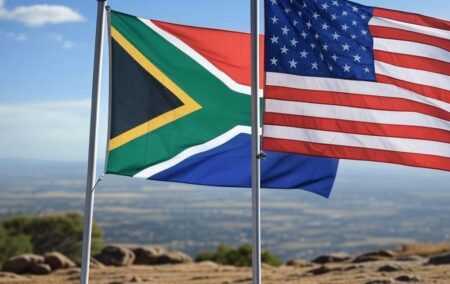The worsening relations between the US and South Africa does not augur well for either of them. Although the two countries are unequal, they are dependent on one another. This trading relationship, which is said to have lasted over 232 years, has shown how big economies like the U.S. can be reliant on smaller economies like South Africa.
It is against this backdrop that the two countries should fit the bill by redefining their fundamental purpose in the modern economy.
This longtime relationship has been defined in the past by complex political discourse over the years, especially between 1948-1994. However, the US enacted sanctions against SA’s unpopular regime in the 1980s. This gesture by the US cemented its relationship with the ANC future government. Then US President Bill Clinton saw an opportunity to build a strong alliance with South Africa which was to become a model of democracy in the African continent.
This relationship between the US and SA grew stronger during the regimes of Nelson Mandela and Thabo Mbeki. It took a different turn in recent years with Jacob Zuma and Cyril Ramaphosa, whose words and deeds have done more harm than good in saving this important relationship. We have also seen how different administrations in the U.S., from Donald Trump to Joe Biden, have been worried about political and policy discourse in South Africa.
From this vantage, it became clearer that South Africa’s inconsistent foreign policy direction would bear devastating political and economic ramifications.
Immaterial
It is immaterial to debate whether AfriForum’s actions are treasonous or not. What is more profound is to think about how South Africa should save this relationship, together with the US, to iron out differences, misunderstanding, misconceptions, and, possibly, misinformation. The writing has been on the wall for some time, but South Africa’s political leadership had prioritised being seen as revolutionaries rather than retaining our strategic partner, the US, which is our second biggest trading partner after China. On the other end, South Africa is the largest US trading partner in the African continent.
There are further probable dire economic and political implications in the deteriorating relationship between the US and South Africa, especially if South Africa is seen continuing with its current foreign policy trajectory which goes against America’s national interests.
The recent Executive Order signed by President Trump has made it clear that the US is not happy with legislation which is deemed discriminatory. The US is also disturbed by South Africa’s anti-Israel position, such as dragging the State of Israel into the United Nations’ International Court of Justice (ICJ) in accusations of genocide against Palestinians, while not acting in the same vein against Hamas which brutally murdered more than 1,200 Israelis and captured more than 250 people as hostages under the tunnels in Gaza.
It is these inconsistencies which are the major drivers of the simmering tensions between the US and South Africa.
Change in relationship
The change in the relationship between the US and South Africa is not driven only by the two issues mentioned above. There is also a concern by the US authorities on how South Africa handled the Russia-Ukraine conflict, where it has been seen leaning towards its BRICS partner, Russia, and not condemning the invasion in Ukraine.
As part of its “Look East” policy, South Africa has been openly mobilising support for authoritarian regimes such as Iran, Venezuela, and Cuba to be part of BRICS. However only Iran’s membership was approved so far. It is a known fact that Iran is disliked by the US for its nuclear programme and its military and financial support to its proxies, who’ve been a thorn to Israel’s security for years now. Iran’s support of Hamas, Hezbollah, and Houthis is explicit, and its government does not even hide it from the public. However, South Africa does not see anything wrong with associating with such violent regimes.
There is more to lose if this relationship is not mended, we know that the African Growth and Opportunity Act (AGOA), a duty-free law meant to benefit some Sub-Saharan African countries, might not be renewed for South Africa later this year if things do not improve between the two countries.
If not addressed, there are greater chances that South Africa could be removed from AGOA, which will be devastating for the economy that is already in a bad shape. This means that companies that export their products to the world’s largest market in the US will have to pay higher tariffs without AGOA’s duty-free deal. That will have far greater economic implications in this country, where we will witness retrenchments, business closures and worsening skyrocketing unemployment.
We are already told that the withdrawal of USAID support would have a dire impact on the HIV/AIDS research programmes which have been helpful in that regard. To make matters worse, there is a sense that the US might not be supportive during South Africa’s G20 presidency, which will create a difficult political conundrum for South Africa as we learnt that the US Secretary of State might not attend the next meeting to be held on South African soil.
It is important for South Africa to send esteemed and respected individuals to meet with their American counterparts in a bid to address the ongoing diplomatic tensions. The recent public spat between the two countries is not helpful to either side, and has to be resolved in order to continue growing both economies, creating sustainable development and honouring shared democratic principles.
The views of the writer are not necessarily the views of the Daily Friend or the IRR.
If you like what you have just read, support the Daily Friend
Image: Grok

